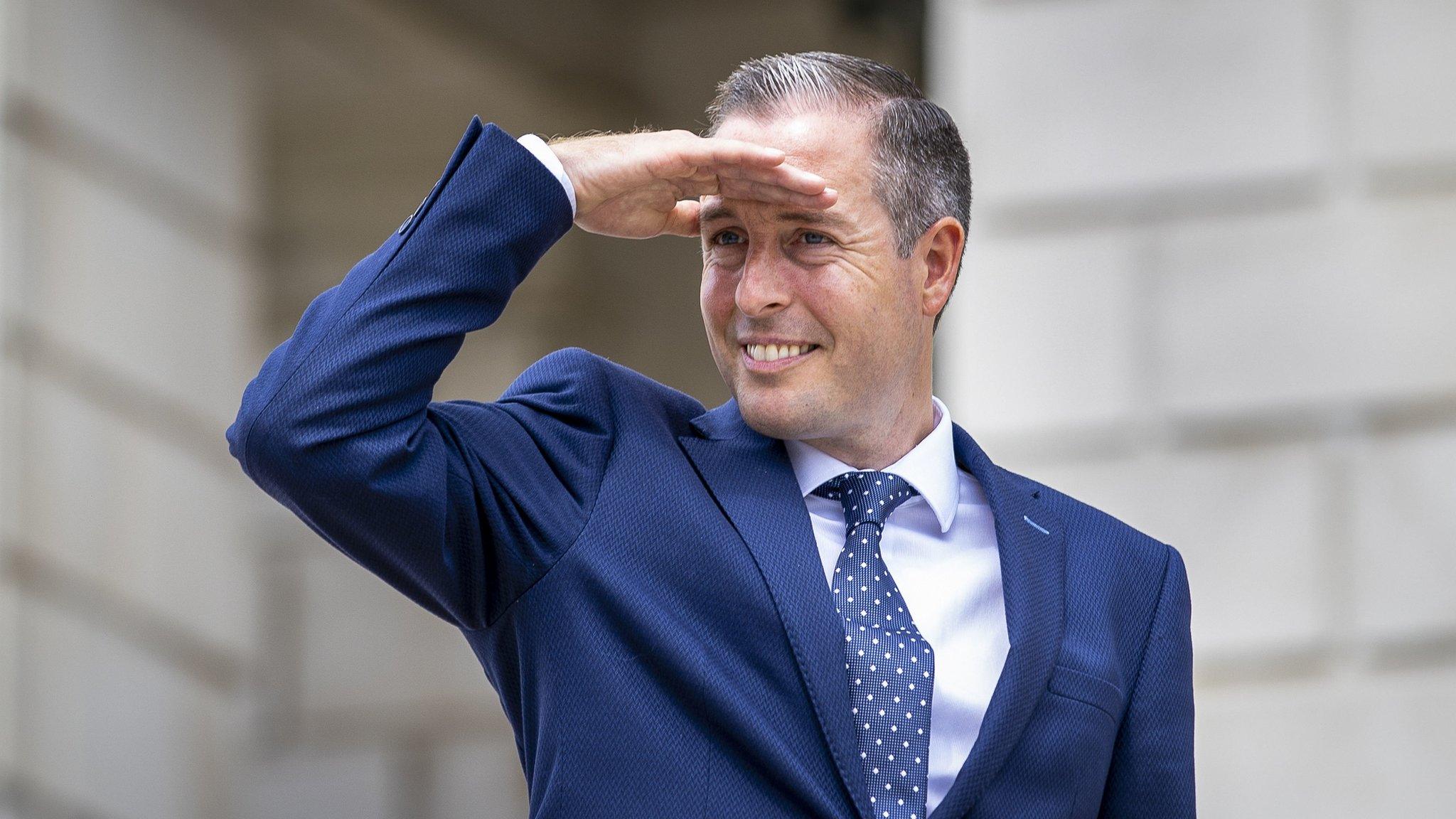DUP: Sinn Féin wants 'more than fluffy words' from Edwin Poots
- Published
Sinn Féin vice-president Michelle O'Neill wants "more than just fluffy words" from DUP leader Edwin Poots
Michelle O'Neill has said she wants to see "more than just fluffy words" from Edwin Poots about how their two parties will work together.
Asked if she would accept Paul Givan's nomination as first minister, Ms O'Neill said the public want political agreements honoured.
The deputy first minister said she will engage with all parties, but on the basis of good faith and respect.
Mr Givan's appointment is contingent on Sinn Féin support.
Mr Poots announced Mr Givan's nomination and other ministerial appointments on Tuesday.
Ousted Democratic Unionist Party (DUP) leader Arlene Foster will remain as Northern Ireland's first minister until at least a meeting of the British-Irish Council in County Fermanagh on Friday.
It is understood she will not remain in the post beyond Monday, but could leave sooner, thereby also triggering Ms O'Neill's resignation.
There is then a seven-day period allowed for the approval of a first minister and deputy first minister by power-sharing partners Sinn Féin and the DUP.
It has been speculated that Sinn Féin may use this to ensure the DUP gives firm commitments on areas yet to be delivered in the New Decade, New Approach deal, which restored devolution in January 2020, including a timetable for Irish language legislation.
Ms O'Neill said she will engage with Mr Poots and Mr Givan, but it has to be on the basis of "doing what's right for the public".
BBC News NI understands that Sinn Féin president Mary Lou McDonald met Mr Poots in Belfast on Wednesday night.
Responding to Ms O'Neill, incoming Economy Minister Paul Frew said she was right that "fluffy words won't cut it".
Mr Frew's appointment was announced on Tuesday in as part of the DUP's new Stormont ministerial lineup. He takes over from Diane Dodds.
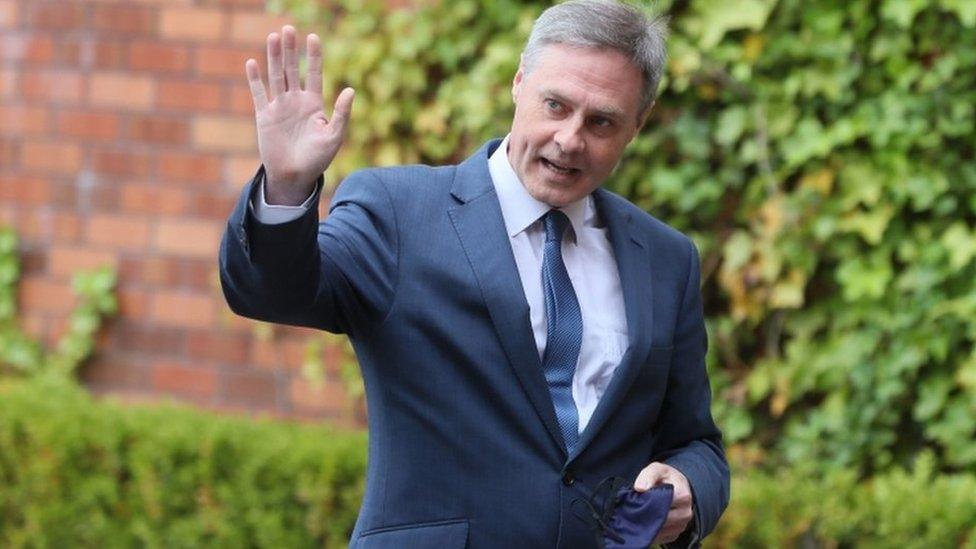
Paul Frew says the deputy first minister needs to sit down with Paul Givan
But he said the deputy first minister needed to "sit down" with Mr Givan to co-ordinate a plan of delivery for New Decade, New Approach.
"Think about the waiting lists, the economic struggles we're having - police numbers even, that's all contained. Let's get it all out and get a delivery plan settled," he said.
Asked if that extended to commitments on Irish language legislation, Mr Frew said the "culture piece is very important to some people".
"Let's see it all rolled out and delivered," he added.
Mr Frew has dismissed concerns that Sinn Féin could refuse to nominate a deputy first minister unless Mr Givan commits to Irish language legislation.
"Why would Sinn Féin not nominate a deputy first minister? Apart from the media, I haven't heard Sinn Féin say this either privately or publicly. We have to respect mandates here. That needs to proceed so we can have an executive in place."


Sinn Féin is playing its cards close to its chest, and I would say that is deliberate.
It also wants to see how things will shake-out behind the scenes.
You get the sense that there will be a bit of negotiation between Sinn Féin and the DUP during that seven-day period after Arlene Foster resigns.
Sometimes when the parties here are given time, they like to use it.
But it's hard to see how they wouldn't be trying to iron things out behind the scenes.
Both parties want political stability. They've got a massive job on their hands with waiting lists and the recovery from the pandemic.
If things were to crumble next week, it means you wouldn't have executive meetings, and there is still an awful lot of business that needs to be done.

Mr Frew also expressed regret that DUP members have quit the party over its new leadership, but insisted "change must happen".
It comes after outgoing DUP ministers Diane Dodds and Peter Weir criticised Mr Poots' selection of new ministers for showing a lack of "healing" within the party.
On Wednesday, Mrs Dodds stood over her comments.
"Division is very difficult for any political party and it's true also of the DUP," she said. "I hope that the party can come together."
Mr Weir, also speaking on Wednesday, said he believed the situation was "sad".
"I think this has been a very traumatic time for the party. I think we do need to see healing," he said.
"I think at times there have been opportunities that have been missed, and I think as a party we can't keep on missing those."
Speaking on the BBC's Good Morning Ulster programme for the first time since his selection, Mr Frew denied the party was fractured, saying: "There are no more camps, no more teams. There is one DUP."
"People lose positions in political parties. These things happen and when you look back on them, it's actually a blessing," he added.
"There will be strategic changes and strategic vision going forward."
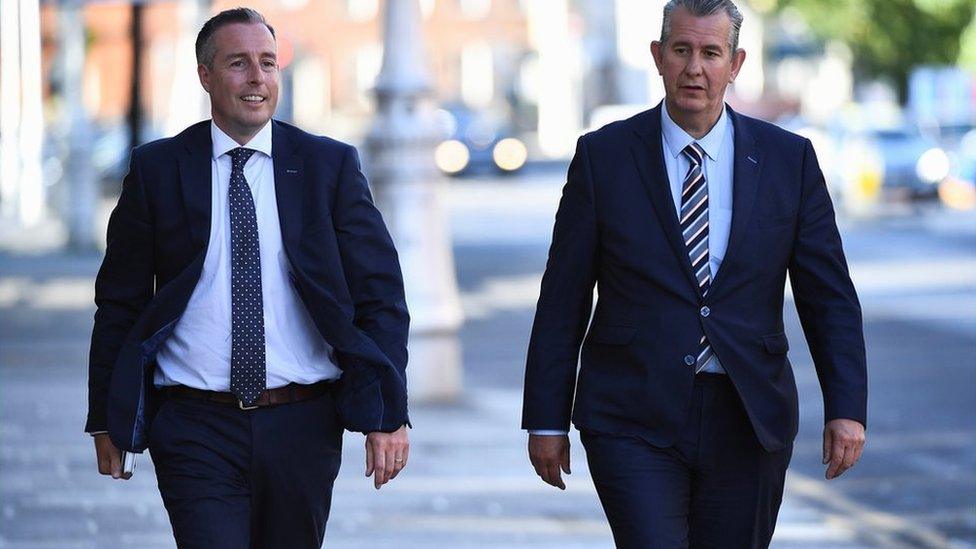
Edwin Poots has nominated Paul Givan as the new first minister
Two councillors were among a number of party members to resign this week over concerns about the party's direction under Mr Poots.
Newry, Mourne and Down councillors Glyn Hanna and Kathryn Owen, with Mr Hanna saying there was a "culture of fear" and "bullying" in the party.
Mr Frew said "reaching out" had happened and that he hoped those who had decided to leave "will in the future be able to reconcile that and come back into the fold".
"Edwin will discuss these things internally, where a party should," he added.
New incoming DUP junior minister Gary Middleton told BBC Radio Foyle the party must now re-engage with members angered by the leadership challenge.
He said he could "understand the hurt and upset" some people feel by the ousting of Arlene Foster.
The Foyle MLA , who supported Sir Jeffrey Donaldson in the party's leadership contest, said Mr Poots has his full support.
'Protocol needs to be scrapped'
Meanwhile, Mr Frew said one of his first tasks as economy minister would be to embark on a "three-week listening tour" across Northern Ireland to engage with business and training organisations.
He said his belief is that the Northern Ireland Protocol "needs to be scrapped, not least for business but for the democratic process here in Northern Ireland and the deficiency that that brings".
The protocol is the part of the Brexit withdrawal deal that created a trade border between Northern Ireland and Great Britain, in order to prevent goods checks along the Irish land border between Northern Ireland and the Republic of Ireland.
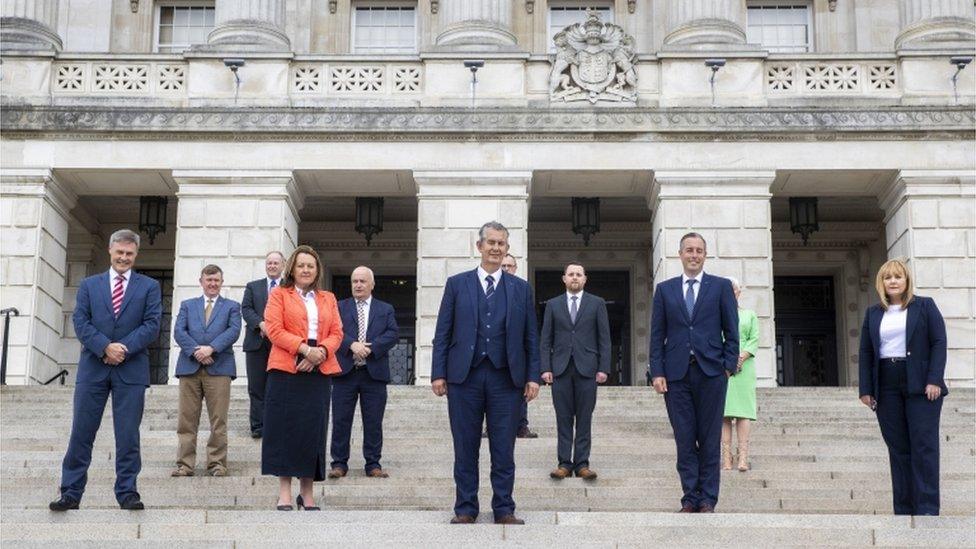
DUP leader Edwin Poots with part of his first ministerial team at Stormont
"Businesses can't continue with the tests and restrictions, they can't continue with the instability and I would like to see the EU take a more pragmatic approach on this, but the EU and pragmatism doesn't really go together," added Mr Frew.
However he said that he had no problem with Invest NI using the protocol as a means of promoting Northern Ireland business.
Mr Frew also said he would be pushing the British government to unilaterally extend the grace period for chilled meats.
Asked if he thinks the EU is preparing to offer concessions on the Northern Ireland Protocol, he said: "I hope there is but I don't see much evidence from the EU in this regard. There is no proportionality with their tests and checks - they're intolerable."
Mr Frew, who has previously spoken out against strict Covid restrictions, also suggested the current regulations need to be reviewed.
"I think we need a stocktake of the restrictions we have in place - the rationale for them, the logic behind them, the data that supports them, and let's be transparent and accountable to our people.
"And let's show the people the evidence, because if you show the people the evidence, there'll be far higher compliance.
"There are some restrictions that are still in place and have been in place over the past month that are not logical."
- Published8 June 2021
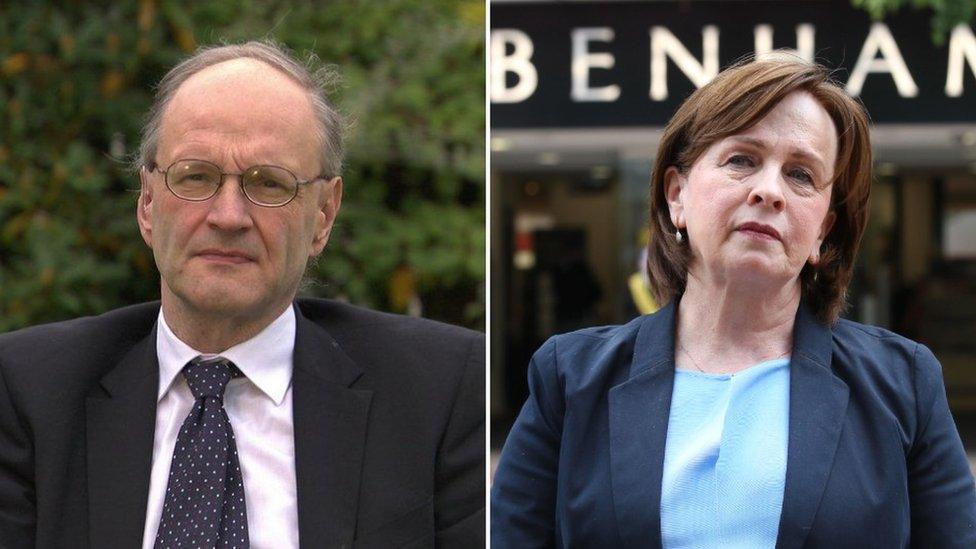
- Published8 June 2021
